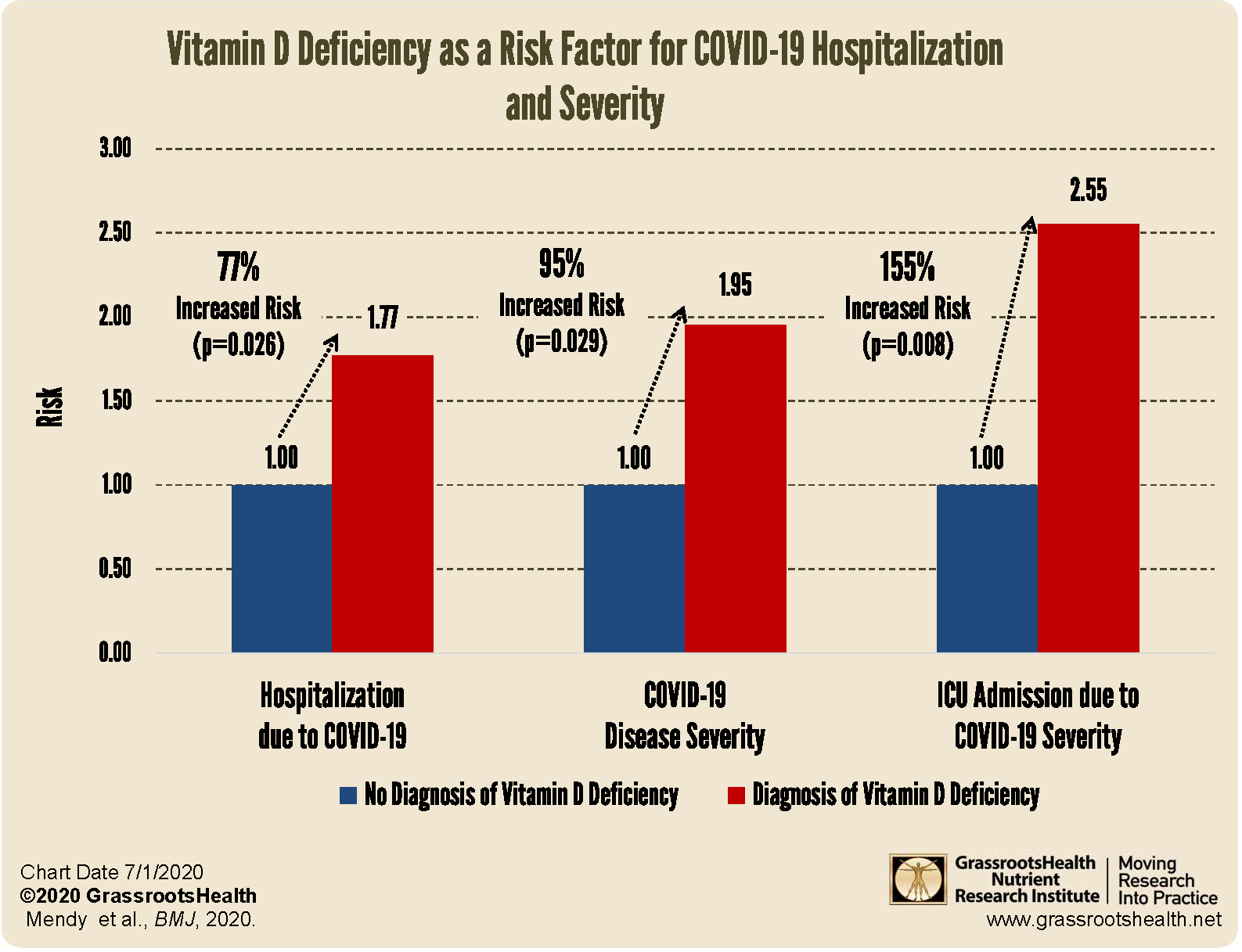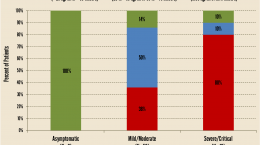Published on July 3, 2020
 Decades of research have identified vitamin D as a vital component to a healthy immune system. Now, amidst the COVID-19 pandemic, there is talk about vitamin D and its possible role in decreasing the risk of COVID-19 infection and severity. While there has not yet been a published randomized controlled trial (RCT) on vitamin D serum levels and COVID outcomes, data showing supplementation with vitamin D and other nutrients having a protective effect (such as that from Tan et al.) continues to be published. The study below adds to the strength of this observational data on the relationship between vitamin D and COVID-19.
Decades of research have identified vitamin D as a vital component to a healthy immune system. Now, amidst the COVID-19 pandemic, there is talk about vitamin D and its possible role in decreasing the risk of COVID-19 infection and severity. While there has not yet been a published randomized controlled trial (RCT) on vitamin D serum levels and COVID outcomes, data showing supplementation with vitamin D and other nutrients having a protective effect (such as that from Tan et al.) continues to be published. The study below adds to the strength of this observational data on the relationship between vitamin D and COVID-19.
Findings from the University of Cincinnati Health System
A pre-print study (meaning it has not yet been peer-reviewed) by Mendy et al. looked at medical record data from 689 patients diagnosed with COVID-19 in the University of Cincinnati health system and analyzed it to identify potential risk factors associated with COVID-19 hospitalization (a hospital stay of at least 24 hours) and severity (defined as intensive care unit admission and/or death during hospitalization). Preexisting conditions, including vitamin D deficiency, were identified for each patient using the 10th revision of the International Classification of Diseases (ICD10) codes.
Of the 689 patients diagnosed with COVID-19:
- The average age of patients was 49.5 years
- 53.0% were male
- 29.2% non-Hispanic White
- 25.5% non-Hispanic Black
- 32.5% Hispanic
- 12.8% ‘Other’ race/ethnicity
In terms of COVID-19 specific outcomes:
- 31.3% patients were hospitalized
- 13.2% patients ended up with a severe COVID-19 infection (defined as admission to ICU or death)
- Vitamin D deficiency significantly increased the risk of hospitalization due to COVID-19 (77% increased risk), COVID-19 disease severity (95% increased risk), and the need for intensive care unit admission due to COVID-19 (155% increased risk)
Other Risk Factors Associated with COVID-19 Disease Severity
The study authors found the following sociodemographic factors associated with hospitalization and/or COVID-19 severity:
- Older age
- Non-Hispanic Black or Hispanic (compared to non-Hispanic White)
- Smoking
Preexisting conditions (or comorbidities) found to be associated with hospitalization and/or COVID-19 severity included:
- Obesity
- Diabetes
- Hypercholesterolemia
- Asthma
- Chronic obstructive pulmonary disease (COPD)
- Chronic kidney disease
- Cardiovascular diseases
- Osteoarthritis
- Vitamin D deficiency
- Hematological disorders (such as anemia, coagulation disorders, and thrombocytopenia)
Of these factors, vitamin D deficiency is likely the easiest to remedy; and correction of vitamin D deficiency may have positive effects regarding several of the other conditions as well. Do you know what your vitamin D level is? Test today and find out!
Are You Getting Enough Vitamin D to Help Yourself?
We’re in a time of great crisis that could be greatly affected by making sure you and everyone you know has a serum level of at least 40 ng/ml. Help us help you.
Do you know what your vitamin D level is? Be sure to test today to find out, and take steps to keep it within a target of 40-60 ng/ml or 100-150 nmol/L! Give your immune system the nutrients it needs to support a healthy you and protect yourself from unnecessary diseases.
GrassrootsHealth Nutrient Research Institute is preparing to do a Community RCT with the use of our myData-myAnswers nutrient health system that over 15,000 people are already using for their health. We will demonstrate how one can use the Nutrient Research Model established by Dr. Robert Heaney to establish the effect of vitamin D serum levels of at least 40 ng/ml (100 nmol/L) on risk reduction with different ethnicities in the population. Please let us know if you’re interested in helping sponsor this project.
CLICK HERE for updates and new information about the project.
Through GrassrootsHealth Nutrient Research Institute, you can also test your essential elements magnesium, copper, zinc and selenium, toxins such as lead, mercury and cadmium, as well as your omega-3 levels, inflammation levels and thyroid stimulating hormone (TSH) level. Find out your levels today! Log on to the test selection page (click the link below) to get your tests and see for yourself if your levels can be improved.
Make sure you track your results before and after, about every 6 months!
Click Here to Access the Test Page
How can I track my nutrient intake and levels over time?
To help you track your supplement use and nutrient levels, GrassrootsHealth has created the Personal Health Nutrient Decision System called
For each specific supplement, you can track what days you take it, how much, and many other details. This will help you know your true supplemental intake and what patterns of use work for you to reach and maintain optimum nutrient levels. Check it out today!









